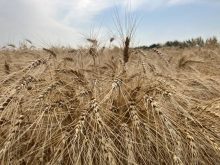Anyone selling ammonium nitrate fertilizer in Canada will need to be registered and its resale will be prohibited under new federal regulations starting June 1.
The new regulations announced Wednesday will require that anyone who sells ammonium nitrate — in its solid form at a concentration of 28 to 34 per cent nitrogen — or who sells any of eight other restricted chemicals be registered with the explosives regulatory division of Natural Resources Canada.
The sellers must also comply with security measures for storage, record-keeping and customer identification, the government said in a press release.
Read Also

Pea, lentil outlooks have some positive signals – Penner
As pulse growers consider what to plant this spring, Chuck Penner of Leftfield Commodities Research said there is some optimism in the Canadian pulse market. Penner gave a presentation at the Saskatchewan Pulse Growers meeting in Swift Current on Feb. 4.
“Additionally, the resale of ammonium nitrate by customers will be prohibited,” the government wrote.
“This list of chemicals was drawn up on the basis of expert scientific and security analyses and includes chemicals that pose the greatest risk, and therefore, require regulatory control,” federal Public Safety Minister Stockwell Day said in the release.
While the regulations for ammonium nitrate will kick in June 1 this year, the same regulations for nitric acid, nitromethane, hydrogen peroxide, potassium nitrate, sodium nitrate, potassium chlorate, sodium chlorate and potassium perchlorate won’t take effect until March 1, 2009.
“We encourage everyone involved in the agriculture industry to be in full
compliance well before the regulations start coming into effect on June 1,
2008,” Canadian Fertilizer Institute president Roger Larson said in a release Wednesday.
“Security is everyone’s business.
Fertilizer companies have been essentially in compliance for a number of years
under the voluntary code of practice. These regulations will strengthen our
code and are consistent with security measures in other countries.”
All nine substances have been deemed “explosives precursors” and face new restrictions “in response to the threat posed by improvised explosive devices.” That said, all nine currently have “a wide range of legitimate uses,” the government wrote.
Nitric
acid, potassium nitrate and sodium nitrate are also used in fertilizers or in making fertilizers, the CFI noted, adding that ammonium nitrate is the only one commonly used as a fertilizer in Canada.
By “precursors” the government means the chemicals are not themselves explosives but can be used to make improvised explosive devices. Ammonium nitrate is the most common of the nine, the government wrote.
The new regulations aren’t expected to be a burden on the affected industries as “they formalize business practices already underway,” the government wrote. No Canadian fertilizer manufacturer currently makes ammonium nitrate.
“Start-up costs” for the industry as a whole relating to the new regulations are expected to be only about $120,000, and $20,000 per year afterward, the government said.
Among the most infamous attacks involving such chemicals, the bombing of a U.S. federal building in Oklahoma City in 1995, killing over 150 people, was carried out using a combination of ammonium nitrate and motor fuel. In a recent note to industry stakeholders on the pending restrictions, Natural Resources’ explosives regulatory division noted that major terrorist attacks in Bali in 2002, Madrid in 2004 and London, England in 2005 were “all carried out with common explosives.”
Ottawa’s announcement comes about three weeks after the start of a nationally published spat concerning farmers’ access to ammonium nitrate, between representatives of Farmers of North America (FNA), a Saskatoon-based farmers’ purchasing group, and of the Canadian Association of Agri-Retailers (CAAR) in Toronto’s Globe and Mail.
A March 1 article quoted a CAAR representative as saying that shipments of ammonium nitrate, if kept without proper security precautions, could set up the circumstances for an “al-Qaeda yard sale going on in Western Canada,” a reference to the terrorist group tied to the Sept. 11, 2001 attacks on the U.S.
FNA had imported a boatload of 34-0-0 ammonium nitrate for its Prairie members from a supplier in Russia through the port of Churchill, Man., in October last year. It reacted to the Globe article last week with a press release and a round of advertisements focusing on the “al-Qaeda” remark and suggesting CAAR was attempting to unfairly “stir up urban fears against farmers.”
As for the regulations announced Wednesday, FNA said on its web site Thursday that “these regulations do not incorporate any new restrictions and do not prohibit the purchase or use of 34-0-0 by farmers.”
FNA’s farmer members “should not be concerned that the recent remarks by (CAAR) that farmers would be involved in ‘Al Queda (sic) yard sales’ have anything to do with these regulations,” FNA wrote. “They do not and FNA will continue to try to bring to you competitively priced fertilizers of all kinds.”
“Care needs to be taken to keep ammonium nitrate in the right hands,”
said Dave Finlayson, executive director of the Fertilizer Safety and Security
Council, in the CFI’s release Wednesday.
“Retailers know their customers, local soil conditions and the
products needed for farming in their area. This knowledge can be put to use
when selling ammonium nitrate, which is particularly important to farmers in
Eastern Canada. Retailers are keeping records on ammonium nitrate sales to
protect the public.”















